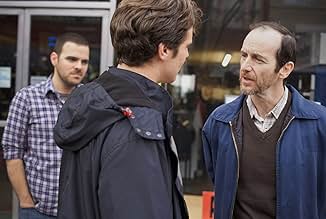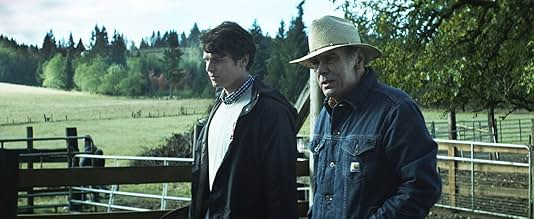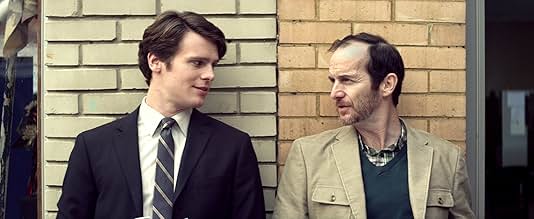A cocky young man travels to Oregon to work on an apple farm. Out of his element, he finds his lifestyle and notions being picked apart by everyone who crosses his path.A cocky young man travels to Oregon to work on an apple farm. Out of his element, he finds his lifestyle and notions being picked apart by everyone who crosses his path.A cocky young man travels to Oregon to work on an apple farm. Out of his element, he finds his lifestyle and notions being picked apart by everyone who crosses his path.
- Director
- Writers
- Stars
- Awards
- 1 win & 2 nominations total
Zach Sanchez-Vitale
- Military Guy
- (as Zach Sanchez)
Blake Lindsley
- David's Mom
- (voice)
Eloy Méndez
- Pedro
- (as Eloy Mendez)
Cami Storm
- Pretty Mexican Girl
- (as Cami Marie)
- Director
- Writers
- All cast & crew
- Production, box office & more at IMDbPro
Featured reviews
The instant I saw the boy from Glee on the screen with his college sweater, against a score of staccato claps, I knew this film and the word 'Pretentious' were already entwined till the credits with the muted plucking music.
So as the Backlash B-tch I am, I decided to watch the whole film just to spite that particular stereotype.
God, I'm glad I did! I was born in a religious cult...called C.O.G. So it's kind of unsurprising that I resonated with it. But this film has so much that is human, and raw, and true about it that it has to have some impact on the rest of you. Groff's performance goes from cocky and superior in the most honest portrayal of the usual American postgrad I've seen, to so vulnerable and naive and yearning that my heart felt like it was being crushed. He's as lost, disenfranchised and confused as every other 20-something I know - but it seeps out of his pores and swims in his eyes in a way that's very hard to watch. I guess that's the Millenial Generation, stripped bare and made fun of, yet not looked down on. David is just a boy, not a polarising symbol of a Lost Generation, and the film knows this.
Just a boy. That's why it hurt to see him be taken advantage of, time and again. It hurt even more, for me, to watch him try to find himself and cure his sexual 'sickness' in religion. I have known people like John. They exist. Everyone in this film exists.
I'm not being coherent. This film impacted me that much.
I think you should watch it.
So as the Backlash B-tch I am, I decided to watch the whole film just to spite that particular stereotype.
God, I'm glad I did! I was born in a religious cult...called C.O.G. So it's kind of unsurprising that I resonated with it. But this film has so much that is human, and raw, and true about it that it has to have some impact on the rest of you. Groff's performance goes from cocky and superior in the most honest portrayal of the usual American postgrad I've seen, to so vulnerable and naive and yearning that my heart felt like it was being crushed. He's as lost, disenfranchised and confused as every other 20-something I know - but it seeps out of his pores and swims in his eyes in a way that's very hard to watch. I guess that's the Millenial Generation, stripped bare and made fun of, yet not looked down on. David is just a boy, not a polarising symbol of a Lost Generation, and the film knows this.
Just a boy. That's why it hurt to see him be taken advantage of, time and again. It hurt even more, for me, to watch him try to find himself and cure his sexual 'sickness' in religion. I have known people like John. They exist. Everyone in this film exists.
I'm not being coherent. This film impacted me that much.
I think you should watch it.
C.O.G. is my favorite David Sedaris essay, even before I moved to Oregon and recognized some of its landmarks. The movie even begins with one of my favorite speeches from the essay, although the speech is much better on the page.
The story concerns a young man who fantasizes about joining the working class (as in Grapes of Wrath) and travels to Oregon to pick apples, work in an apple sorting factory, and make jade sculptures with a temperamental man who is trying to convert him to Christianity. In the essay, Sedaris, as himself, is state school educated, a stoner, accustomed to menial jobs, and from a working class family. In the movie, David – or Samuel, as he's calling himself – is a smarmy preppy educated at Yale who is first depicted reading Darwin's Origin of Species. When Sedaris makes fun of crazy people on a Greyhound, or working class people at a factory, it is clear that he is making fun of his own expectations, as well as people not far below him in social class. This is quite a contrast to an upper class character looking down on dumb poor people. This is one of the movie's first flaws. And it colors almost everything. What is his true motivation, if he is so jaded and cynical? What is the movie trying to tell us about working people and Christians when it presents us with this character as its hero?
A second flaw is one chief among Hollywood movies, even those intended for the art-house crowd. Though David Sedaris himself, as well as the lead actor, are openly gay, this movie wouldn't want to come out and just say such a thing, why people might flee into the streets. So it teases us with making us believe he might have a female love interest; it does not tell us what the source of the conflict is with his family (it would appear to be his coming out); it doesn't tell us why he is so freaked out by a co-worker's gay advances (is it because he's grossed out by the man or the concept?), or how any of this might impact his potential conversion to Christianity. I'm sure the director has a lofty, annoying explanation for this oversight, but I can count two "so, was he gay?" posts already on the list of five that show up on the main page.
The score, mainly percussion, will be off-putting to many, especially in the first scenes on the bus. And the ending will also confuse. After personal conflicts with many of the characters, how will his opinions and his Christian conversion change? We know IRL that David Sedaris went on to a happy life as a bestselling author. A less vague ending could have shown what the character learned from these experiences, especially since this movie tried so hard to be more sincere than its comedic base.
This movie has some things going for it, but it is philosophically a disappointment.
The story concerns a young man who fantasizes about joining the working class (as in Grapes of Wrath) and travels to Oregon to pick apples, work in an apple sorting factory, and make jade sculptures with a temperamental man who is trying to convert him to Christianity. In the essay, Sedaris, as himself, is state school educated, a stoner, accustomed to menial jobs, and from a working class family. In the movie, David – or Samuel, as he's calling himself – is a smarmy preppy educated at Yale who is first depicted reading Darwin's Origin of Species. When Sedaris makes fun of crazy people on a Greyhound, or working class people at a factory, it is clear that he is making fun of his own expectations, as well as people not far below him in social class. This is quite a contrast to an upper class character looking down on dumb poor people. This is one of the movie's first flaws. And it colors almost everything. What is his true motivation, if he is so jaded and cynical? What is the movie trying to tell us about working people and Christians when it presents us with this character as its hero?
A second flaw is one chief among Hollywood movies, even those intended for the art-house crowd. Though David Sedaris himself, as well as the lead actor, are openly gay, this movie wouldn't want to come out and just say such a thing, why people might flee into the streets. So it teases us with making us believe he might have a female love interest; it does not tell us what the source of the conflict is with his family (it would appear to be his coming out); it doesn't tell us why he is so freaked out by a co-worker's gay advances (is it because he's grossed out by the man or the concept?), or how any of this might impact his potential conversion to Christianity. I'm sure the director has a lofty, annoying explanation for this oversight, but I can count two "so, was he gay?" posts already on the list of five that show up on the main page.
The score, mainly percussion, will be off-putting to many, especially in the first scenes on the bus. And the ending will also confuse. After personal conflicts with many of the characters, how will his opinions and his Christian conversion change? We know IRL that David Sedaris went on to a happy life as a bestselling author. A less vague ending could have shown what the character learned from these experiences, especially since this movie tried so hard to be more sincere than its comedic base.
This movie has some things going for it, but it is philosophically a disappointment.
I knew very little about this film when I went into it except that it was inspired in some way by a David Sedaris essay. It surpassed my expectations in a beautiful and lasting way. It's extraordinarily funny - often in surprising ways. Like Sedaris' writing, things just happen, and it's the protagonist's reactions that allow the audience to enter this world of poignant meaninglessness. The characters and situations can be so absurd at times that you wonder what kind of world this is, how realistic or how exaggerated or how cinematic - but then you realize that life can really be like that... Groff does a stellar job playing with an open-minded and humorous pretentiousness. But what I thought was most impressive was Kyle Patrick Alvarez's subtly-brilliant treatment of both sexuality and religion, both of which are such matter-of-fact gray areas in the film that they leave the viewer wondering without ever asking him to. Great film - definitely catch it when it comes out.
I was really looking forward to this movie. From the trailers it looked funny, mild and sweet. I thought it was going to be about a young man meeting new people and having positive experiences working at an apple orchard. I was wrong. This movie has a few sweet moments but overall, it is grim and bleak. I cannot emphasize this enough. When it is finished, you are left feeling sad and disappointed in humanity. In simple words: this movie is a downer. Really though, if you are looking for a sweet, light hearted movie, you won't find it here. The best thing I can say about the film is that Jonathan Groff is extremely talented and does a great job, but even he can't save this film.
Watching this film the first time in 2021. Jonathan Groff is still going strong and still an excellent actor!! I only watched because he was the star and because it was filmed right here in the great state of Oregon!! Not all of us are whack jobs! I read the Amazon Prime review. It said it was a comedy. Not hardly. I chuckled a couple times, but that was as funny as it got. That dude Curly.... Oh my good god!! I mean I'm gay but I'd be freaked out also!!! Decent film but I hated the ending!! I'm more of a happy ending kinda guy. Pride month already. Hope we can do something this year!! Our Bears Club has plans!!
Ken L. Nunnemaker.
Springfield, Oregon. Home of The Simpsons.
Ken L. Nunnemaker.
Springfield, Oregon. Home of The Simpsons.
Did you know
- TriviaThe first time one of David Sedaris' works has been adapted for the screen.
- SoundtracksEl Gusto
Written by Edward M. Smith
Performed by Eduardo Padilla
Courtesy of Black Toast Music
- How long is C.O.G.?Powered by Alexa
Details
Box office
- Gross US & Canada
- $55,301
- Opening weekend US & Canada
- $32,677
- Sep 22, 2013
- Gross worldwide
- $55,301
- Runtime
- 1h 28m(88 min)
- Color
- Aspect ratio
- 2.35 : 1
Contribute to this page
Suggest an edit or add missing content
































